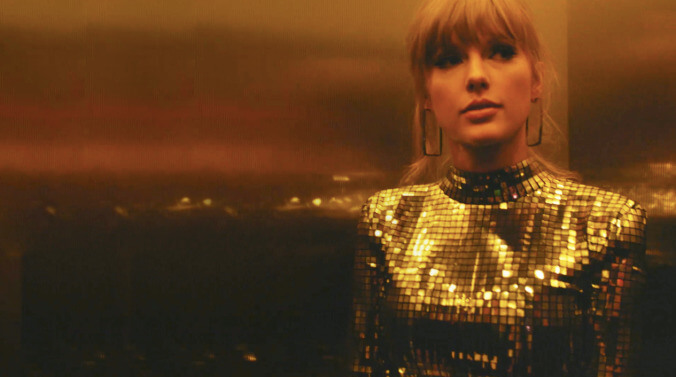Taylor Swift tiptoes toward something real in the Netflix documentary Miss Americana
Film Reviews taylor swift
A massive part of Taylor Swift’s massive appeal is the notion that she’s an open book. Toward the beginning of the new Netflix documentary Miss Americana, she describes the fan experience of listening to her records as “kind of like reading my diary,” after literally reading some of her old diary entries directly to the camera. Lana Wilson’s doc extends the metaphor: It’s intimate, specific, and presented—probably like most diaries—in a way that’s also lightly performative. Swift has always written her life story with an audience in mind. And if you’re going to tell your own story, naturally you’re going to tell the version you’d like to hear.
Miss Americana focuses largely on the last few years of Swift’s career, providing just enough background to illuminate her outlook. Archival footage of early performances from when Swift was as young as 13 highlight an obvious talent who’s also doggedly eager to please, marking the beginning of the film’s arc. As a child, Swift either developed or discovered the dopamine rush of public praise, and it would prove to be the North Star of her professional life: “Those pats on the head are all I lived for,” she says, reflectively and with just a little regret.
That’s a clever way of setting up Miss Americana, which in less capable hands could have been the story of a person who deeply craved success, had the natural talent to achieve it beyond her wildest dreams, then continued to enjoy that success until quietly, happily retiring. (There’s a reason people don’t make that type of movie.) No, what Swift and filmmaker Lana Wilson shape instead is a journey from a girl whose self-esteem furnace is in constant need of fuel to a 30-year-old who’s learning—slowly, perhaps—that Twitter can’t hurt you, and that there are equally important things in life to cheering crowds and industry awards. (Maybe not more important things, but it’s all about baby steps.)
The major inciting events in Swift’s awakening include, of course, Kanye West’s headline-nabbing microphone grab during the 2009 Video Music Awards. Though easy to dismiss as a move by a person even more obsessed with the spotlight than Swift herself—President Obama even publicly called West a “jackass” for it—it clearly shook her. One of the most effective pieces of old footage in Miss Americana is an impromptu interview immediately after the event, in which the usually composed Swift doesn’t exactly know how to answer. She’s probably angry, but she’s been so conditioned not to show that anger—or to only show it playfully in her music—that she doesn’t know quite what to do.
As she gets older and wiser, Swift confronts a creepy morning-show DJ who groped her during a photo op and then had the audacity to sue her for getting him fired. She countersued for $1 and won, and one of Miss Americana’s best moments comes when Swift, a year later, performs “Clean” to a stadium crowd, declaring herself stronger from having lived that fight. And that emboldens Swift to publicly make a political statement in 2018. It was a decision that was more difficult than those outside her circle might have imagined; Wilson captures an argument with Swift and her advisers, including her parents, after she’s decided to publicly endorse a Democrat in Tennessee.
That scene, in which those surrounding her make various arguments against her statement, is powerful: Swift’s dad, otherwise almost unseen in the movie, worries for her safety. (“I’m the one who paid for armored cars,” he quietly intones.) Others make a more crass argument: Does Swift potentially want the size of her audience cut in half with one Instagram post? Does she want to suffer the same fate as her idols, the Dixie Chicks? Watching her struggle with the decision is compelling, even if the real-world consequences—losing some of an enormous audience when you’re already enormously wealthy and famous—are negligible to us normal humans.
Lana Wilson is no pop-minded press-kit director: Her previous films are about abortion providers and suicide prevention. And she coaxes some really thoughtful moments from Swift, like the scene where she comes to understand, but fairly quickly glides over, that her quest for beauty went hand in hand with an eating disorder. And when her mother is diagnosed with cancer—a fight that continues—Swift asks, “Do you really care that the internet doesn’t like you when your mom is sick from chemo?” (The answer is closer to “less” than “no,” it seems—an honest admission.)
But more important to the overall vibe of Miss Americana is that Swift trusts Wilson to be a fly on the wall in the recording studio. The scenes during which she’s creating music are riveting: It’s generally just Swift and a producer/co-writer in a small room, and the speed and happiness with which she works is breathtaking. After 15 years and hundreds of songs, Swift is a master, and even those who don’t appreciate the results will be impressed by her ease. Watching her peck out lyrics on a phone and then deliver them seconds later is like seeing Michael Jordan effortlessly sink three-pointers at practice. Sure, the footage from huge stadiums is fun, too, but that’s rehearsed down to the sequin. Swift, in a hoodie and having fun making something, is ironically much grander to behold. Whether this book is really open, and whether it reveals the “real” Taylor Swift or not, Miss Americana is convincing, positive, and entrancing nonetheless.